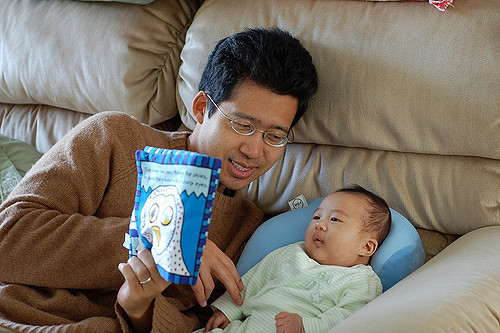Babies usually begin to say their first words anywhere from 9 months to 18 months. At around 8 months, you child will most likely realize that language is the best way of getting what they want. Perhaps their goo-goo’s have started to sound like real words. As children’s mouths become more developed, they can make more consonant sounds. These baby babblings are called protowords, the last step before that first word!
Although you might not realize, you’re probably already encouraging your child’s learning development. Motherese, or baby talk, is the exaggeration of words. This type of baby talk has a song-like quality, with your voice going up and down. Believe it or not, this type of sound is easiest for your infant to differentiate and parents all over the world do this same type of voice in their own languages—even deaf mothers with exaggerated hand motions! Your motherese naturally stays 6 months ahead of your child’s language development, encouraging more advanced words and sounds.
Talking to your child is very important for their language skills. As this is still within their critical period, a developmental time in which their brains are figuring out how to learn certain skills, it’s important to continually talk, read, and sing to your child. Narrating what you’re doing and keeping your child engaged in conversations—even if they don’t respond—is a great way to finally hear those first words. Pointing and naming objects will help your child associate words and their environment. Nursery rhymes and lullabies are also a great way to encourage your child’s language development. The repeating sounds and fun melodies convey emotions and rhythm in an age-appropriate way.
Another fantastic method is reading aloud to your child. If you have older children, reading to both of them is a great way to include the whole family. Although it might seem a bit strange to read to someone who can’t quite speak yet, reading is a great intimate time to teach your child different, appropriate methods of communicating. Most adults have their “reading voice” and emphasizing a bear’s growl or a southern accent from a storybook is a great method of introducing your child to varied ways of speaking and a larger vocabulary. This promotes early reading as well and children that are read aloud to have a better grasp of language than kids that just learn language conversationally.

Reading to your baby is a great way to facilitate language development and also spend some quality time together! // source: flickr
This is a great time in your child’s life and as they begin saying their first words, encouraging their sounds, speaking to them regularly, and reading to them will make sure to encourage their language development.
Supplementary Material
1. For more information on developmental milestones, when to be concerned, and helpful videos demonstrating these milestones, see Pathways’ information on tracking your baby’s milestones through their first year. All of these milestones are validated by the American Academy of Pediatrics. See the video below for milestone’s to look out for regarding your infant’s communication skills
2. We mentioned above that reading aloud is a great way to facilitate your child’s language development. It is also a great way for the family to spend time together! Here is a list of the 100 best books you can read aloud to your child.
3. Need a place to get books to read to your child? This link will help you find the closest public library to you.
References
Mayes, L. C. & Cohen, D. J. (2002). The Yale Child Study Center Guide to Understanding Your Child: Healthy Development from Birth to Adolescence. Boston: Little, Brown, and Company.